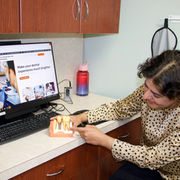How to Know If Your Wisdom Tooth Needs Extraction Already
- Dr. Michael Ofir

- Aug 6, 2023
- 3 min read
Updated: Oct 16, 2023
Wisdom teeth, or third molars, are the last permanent teeth to appear (erupt) in the mouth. Some people never develop wisdom teeth. It has become a social norm in your late teenage years to early 20s to hear that you need to remove your wisdom teeth. However, not all people require having their wisdom teeth removed. This decision should be unique to you based on the pros and cons of extracting or leaving wisdom teeth. Sometimes, wisdom teeth may be appropriately aligned and fully functional, causing no problems.
Many people develop impacted wisdom teeth - teeth that don’t usually have enough room to erupt into the mouth or develop normally. If a wisdom tooth doesn’t have room to grow (impacted wisdom tooth), resulting in pain, infection, or other dental problems, you’ll likely need to pull it. Because of the changes in jaw sizes over the past few centuries, many people whose ancestors had enough room for their wisdom teeth find that they do not. Impacted wisdom teeth may erupt only partially or not at all.

For some, removing their wisdom teeth is the safest choice. Impacted wisdom teeth can, in many cases, allow microbes to take up residence deep within the gum-lined area where the wisdom teeth are trapped. This may cause “pericoronitis” (severe infection and inflammation around the wisdom tooth). The most predictable way to manage this is to remove the wisdom teeth. To prevent potential future problems, some dentists and oral surgeons recommend wisdom tooth extraction even if impacted teeth aren’t currently causing problems. If left in place, impacted wisdom teeth can cause chronic infections that damage adjacent teeth. Difficulty with cleaning can accelerate decay.
An impacted wisdom tooth may grow at an angle toward the next tooth (second molar), at an angle toward the back of the mouth, or a right angle to the other teeth, as if the wisdom tooth is “lying down” within the jawbone or grow straight up or down like other teeth but stay trapped within the jawbone. You’ll likely need your impacted wisdom tooth pulled if it results in problems such as pain, trapping food and debris behind the wisdom tooth, infection, gum disease (periodontal disease), tooth decay in a partially erupted wisdom tooth, damage to a nearby tooth or surrounding bone, development of a fluid-filled sac (cyst) around the wisdom tooth, and complications with orthodontic treatments to straighten other teeth.
There are some common signs and symptoms that may indicate the need for wisdom tooth extraction:
Persistent or recurring pain in the back of the mouth where the wisdom teeth are located can be a sign that extraction is needed. This pain can be caused by the teeth pushing against nearby structures, such as other teeth or the jawbone.
Red, swollen, or tender gums around the area of the wisdom teeth may indicate an infection or inflammation known as pericoronitis. This condition can cause pain, difficulty opening the mouth, bad breath, and an unpleasant taste.
Wisdom teeth can exert pressure on neighboring teeth, leading to crowding or shifting of teeth. This can affect the alignment and bite, potentially causing bite problems, misalignment, or orthodontic relapse after previous orthodontic treatment.
Wisdom teeth are located at the back of the mouth, making them difficult to clean properly. This can make them more susceptible to decay and increase the risk of damage to adjacent teeth due to their positioning.
In rare cases, cysts or tumors may develop around impacted wisdom teeth. These growths can cause damage to the jawbone and adjacent teeth if left untreated.
If you are experiencing any of these symptoms or suspect issues with your wisdom teeth, it's essential to consult a dentist. The wisdom tooth removal process is easy. Immediately after the surgical procedure, you will recover in our office for a short time. Pain medications will be prescribed as needed during the first few days after your procedure.
For more information about wisdom tooth extraction and dental health, please call one of our offices or contact us online.

















Comments